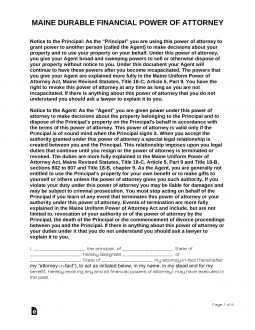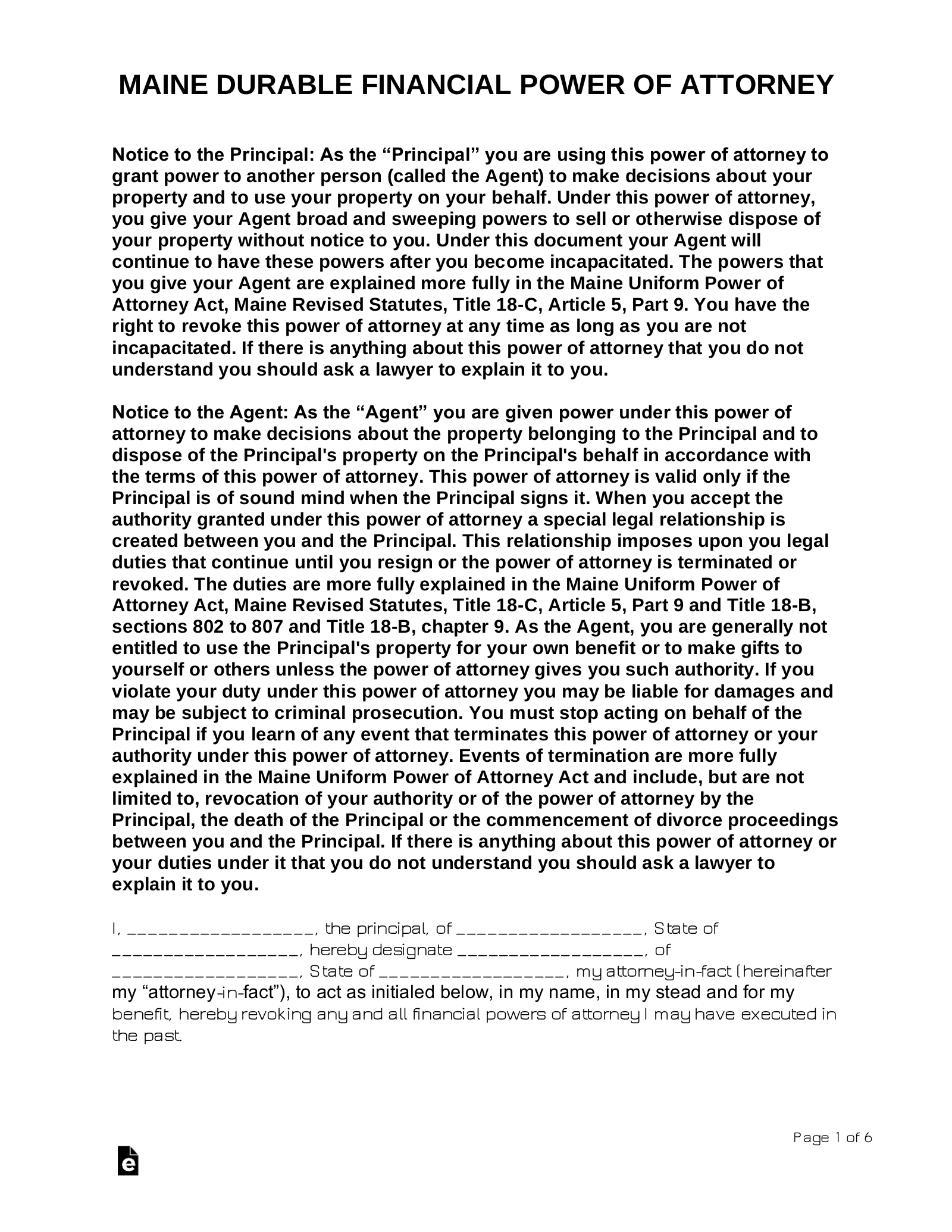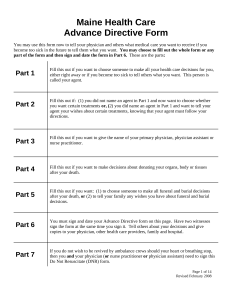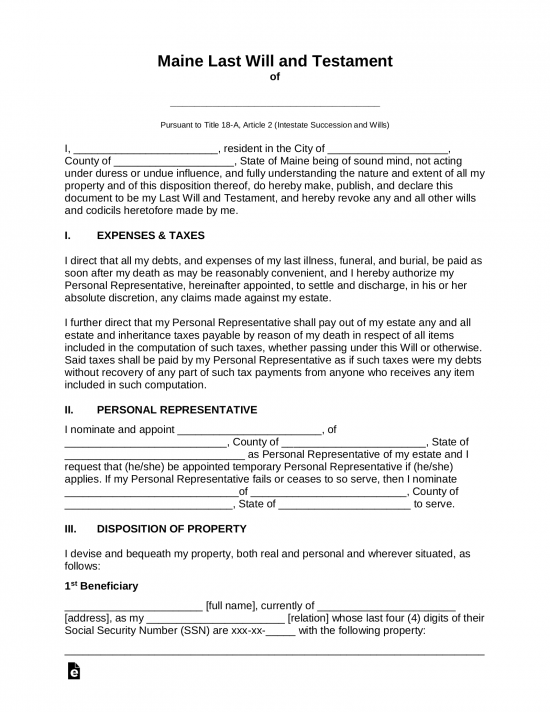Updated August 11, 2023
A Maine durable power of attorney is a document that allows a person (“principal”) to grant authority to someone else (“agent”) and act on their behalf for a variety of financial purposes. The agent is recommended to be a person that is closely trusted such as a spouse or family member. The term “durable” refers to the form’s ability to remain legal, and in effect, if the principal should become incapacitated (common examples include Dementia, Alzheimer’s Disease, etc.).
Table of Contents |
Laws
Title 18-C, Article 5, Part 9 (Uniform Power of Attorney Act)
Definition of “Durable”
“Durable,” with respect to a power of attorney, means not terminated by the principal’s incapacity (§5-902(2)).
Definition of “Power of Attorney”
“Power of attorney” means a writing or other record that grants authority to an agent to act in the place of the principal, whether or not the term “power of attorney” is used (§5-902(7)).
Signing Requirements
The principal is required to sign with a notary public present or a person authorized to take acknowledgments. The agent is required to sign the Agent’s Certification in front of a notary public if and when utilized — though the use of this form is optional. (§ 5-905(1), § 5-951)).
Statutory Form
Although the Maine Revised Statutes do offer an Agent’s Certification Form, the legislature has not created a sample statutory power of attorney form.
How to Write
Download: PDF, MS Word, OpenDocument
Maine Principal Declaration
(1) Issuing Principal. The full name, city, and state of the Principal are the first details required by the first declaration of this appointment.
(2) Maine Attorney-in-Fact. The Attorney-in-Fact being granted the power to speak as or act as the Principal in the State of Maine must be recorded where requested.
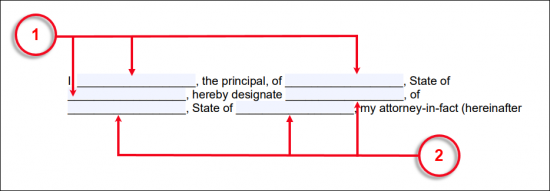
Effective Date
(3) Active Event. Select the event that sets the Attorney-in-Fact’s principal powers as officially effective by initialing (as the issuing Maine Principal) one of the statement descriptions provided. The powers granted to the Attorney-in-Fact by the Principal in the State of Maine may become effective as soon as the Principal delivers his or her notarized signature (choice A) or only when a Physician has provided a written diagnosis of the Principal’s incapacity and inability to handle his or her own financial affairs in the State of Maine. Only the Principal can determine which is more appropriate then, initial the statement he or she wishes applied.
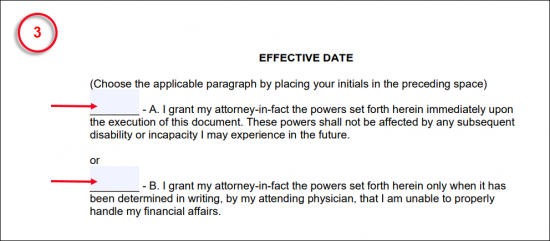
Maine Powers Of Attorney-in-Fact
(4) Banking. The Principal must review the list presented to initial every power he or she wishes to grant to the Attorney-in-Fact in Maine. The first of these items will deliver the right to act for the Principal with financial institutions. The initials of the Principal placed next to this first item give the Agent the right to act as the Principal (i.e. to open and close accounts) with such institutions on behalf of the Principal, as well as handle the contents of his or her financial accounts through deposits, withdrawals, making payments, etc. This is not mandatory. The Principal may choose however many powers to grant his or her Agent from this list but must choose at least one. To avoid graning the Agent the power to act in his or her name with banks and other financial institutions, the Principal only needs to leave this item unmarked and therefore unapproved.
(5) Safe Deposit Box. The Attorney-in-Fact’s principal authority can include the right to manage the safe-deposit boxes of the Principal so long as the Principal delivers his or her initials of approval.
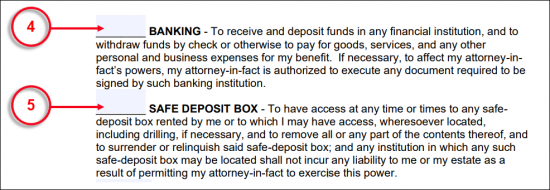
(6) Lending Or Borrowing. The Principal’s ability to lend or borrow funds and maintain/collect on/pay loans or liens with real estate and/or principal property (tangible/intangible) can be conveyed to the Attorney-in-Fact only if such powers are approved of beforehand in this document by that Principal.

(7) Government Benefits. The Principal’s government benefits can be placed in the Attorney-in-Fact’s power to decide and act upon (on behalf of the Principal). Such powers require that the Principal delivers provable authorization through his or her initials.

(8) Retirement Plan. The Principal’s responsibilities and decisions regarding his or her IRA and retirement plans can be placed in the Attorney-in-Fact’s scope of principal authority. It should be mentioned that while a range of actions may be taken when the Attorney-in-Fact is granted this power, the ability to change or cash in on Beneficiaries targeted by the Principal’s IRA and retirement plans will not be delivered to the Attorney-in-Fact. However, if the Principal has determined the Maine Attorney-in-Fact must have the ability to carry out other directives in his or her name then this list item must bear the Principal’s initials.
(9) Taxes. The decisions, filings, and actions that are required to maintain, pay, assess, defend, or collect upon the Principal’s taxes can be conveyed to the Maine Attorney-in-Fact. This will include carrying out Principal directives with any tax entity but bear in mind that oftentimes such Entities (i.e., I.R.S.) will have a separate set of requirements to be filled for the Attorney-in-Fact’s principal powers to be recognized to their full extent.
(10) Insurance. The Attorney-in-Fact’s scope of authority can include the ability to decide upon or effecting the purchase, payment of premiums, and submission of claims on principal insurance policies (or those that may be attained by the Principal). Such powers can have dramatic effects on the life, car, health, dental, and other insurance policies of the Principal thus, authorization from the concerned Principal is required.

(11) Real Estate. The Principal’s real property decisions can be placed in motion by the Attorney-in-Fact when the seventh item on this list is initialed for approval by the Principal behind this document.
(12) Personal Property. If the Attorney-in-Fact is to handle the Principal’s personal property affairs, then the Principal must initial his or her approval.
(13) Power To Manage Property. The same authority carried by the Principal to manage the properties in his or her control can be granted through the initials of the Maine Principal.
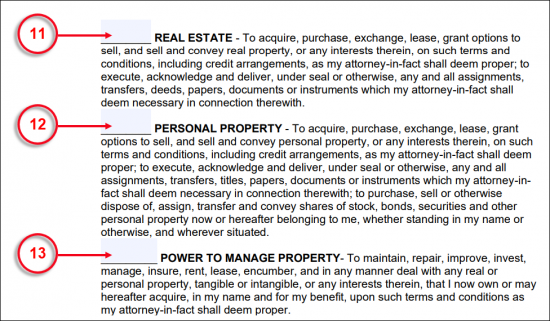
(14) Gifts. The matter of gifts, donations, or forgiveness can be handled or carried out by the Attorney-in-Fact using principal powers through the Principal’s intials to the power subject listed. These actions range from making or accepting gifts in the Principal’s name to ensuring the Principal’s decisions on gifting are honored.

(15) Legal Advice And Proceedings. The Attorney-in-Fact can be authorized to use principal powers in obtaining, dismissing, or deciding upon legal advice on behalf of the Principal as well as engage in administrative proceedings in his or her name with the Principal’s authorization to the final item of defined power.

(16) Special Instructions. Additional comments, conditions, or provisions to the powers granted to the Attorney-in-Fact can be included in this paperwork through the Principal’s direct instructions to the Attorney-in-Fact, desired restrictions, or applicable extensions provided from the Principal or under the Principal’s approval to the available lines below the power list. If no such additions to the grant of power should be applied, the Preparer of this document or the Principal is encouraged to enter the word “None.”

Notarized Principal Signature
(17) Date Of Principal Signature. When the Principal has determined that the above document represents his or her intention, he or she must sign it before a notary. On the day this happens, he or she must first enter the current calendar date.
(18) Principal’s Signature. Once the Maine Principal has recorded the current date, he or she must sign this paperwork then relinquish it to the Notary Public who has observed his or her action.
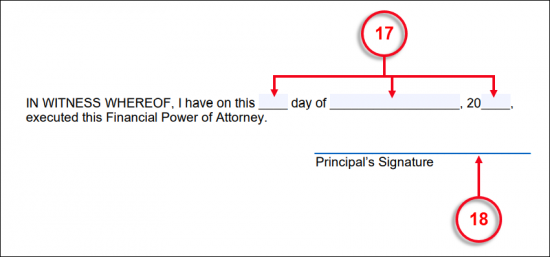
(19) Notary Public. The Notary Public, now in control of the signed document, will process this signature by subjecting it to the notarization process.
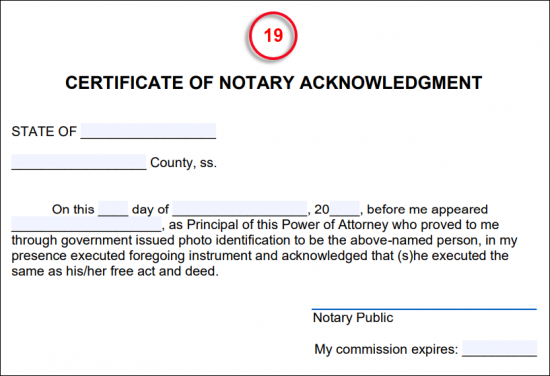
Agent’s Certification
(20) Signature Location. The city and state where the Agent can be reached should be used to introduce the Attorney-in-Fact’s acknowledgment of the principal powers he or she may be expected to wield in the State of Maine.

(21) Agent Name. The full name of the Attorney-in-Fact is required in the statement he or she must acknowledge to complete this section.
(22) Name Of Principal. The name of the Principal as it appears in the first section of this document must be included in the Attorney-in-Fact’s statement.
(23) Document Date. The execution date of the power of attorney the Principal has executed is needed for the Attorney-in-Fact’s acknowledgment and acceptance statement.
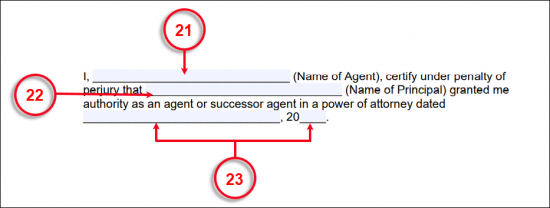
(24) Agent Statement. The Attorney-in-Fact has the option to include additional statements to this declaration.

(25) Attorney-in-Fact Acceptance. To complete his or her acknowledgment and acceptance of the Principal powers being granted for use in the State of Maine, the Attorney-in-Fact must sign and date this statement as a Notary Public observes.
(26) Contact. The Attorney-in-Fact must legibly print his or her name, address, and telephone number to the signature area for completion then release this document to the Notary Public attending his or her execution.
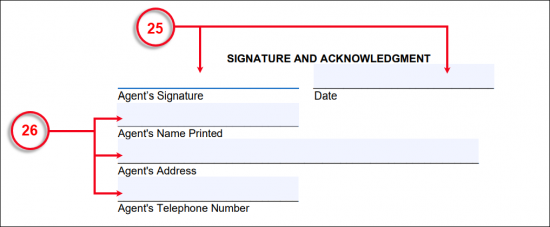
(27) Maine Notarization. The Maine Notary Public handling the Attorney-in-Fact’s signing will complete the area directly beneath the concerned Principal Agent’s specimen signature and contact information.
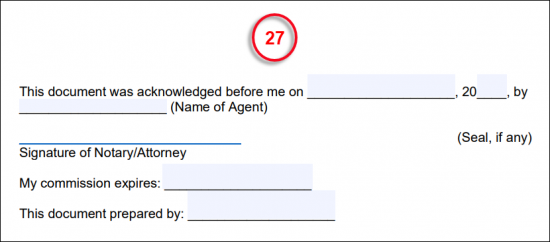
Related Forms
Download: PDF, MS Word, OpenDocument
Download: PDF, MS Word, OpenDocument

